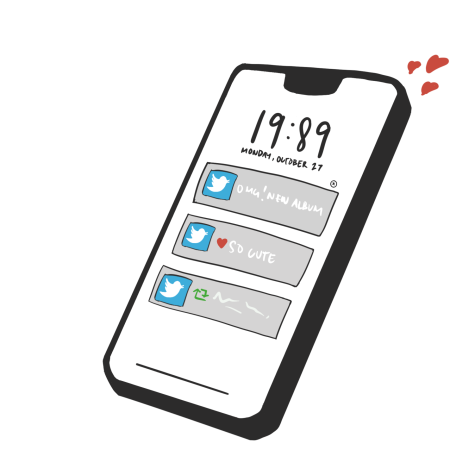In defense of stan culture
The term “stan,” which has come to mean a hyper-devoted fan, is derived from an early 2000s Eminem song, in which he describes an obsessive fan trying to gain his attention. Over the past couple years, this idea has grown into an entity of its own: a subset of the internet, consisting of dedicated and zealous fans bonded by their love for TV shows, musicians, movie franchises, and other forms of media.
Unfortunately, stans are also often the butt of the joke.
The concept of a stan is frequently reduced to an archetype of a hysterical teenage girl, clad in expensive merchandise and consumed by celebrity gossip and Twitter notifications. This preconceived assumption, while not always inaccurate, has convinced the general public that to be a stan is to be senseless and juvenile, causing many fans to hide or undermine their interest in certain media. This is especially true for young women. When a particular artist or piece of media has a majority female fanbase, the quality of said media is regarded as unsophisticated. But why does screaming at a boy band concert carry a different connotation than yelling at a sports game? The widespread contempt towards stans is largely unjustified, and teenagers should not be looked down upon for sharing what they’re passionate about, especially when stan communities are more beneficial than most would believe.
I’m well familiar with feeling the need to conceal my true enamorment for certain artists. Besides the occasional tour sweatshirt, there’s not much about me that outwardly reveals my self diagnosis as a stan. Nobody would assume that at one point in my life, tucked away in the depths of my phone sat not one, but two fan accounts devoted to a certain celebrity. And it would be unbelievable that said celebrity, upon stumbling across my fan accounts, invited someone like me to her house to listen to her new album before its release. But now, I’ll finally admit that international popstar Taylor Swift has influenced much of my life.
And why should I be ashamed of that? While I recognize that claims of stan culture’s pernicious nature are not unfounded, I contend many of these fan based online communities are immensely positive. Through social media, individuals across the globe have formed meaningful connections with those who share similar adorations, celebrating art, theories, and lyrical analyses amongst one another. This dedication isn’t always just a hobby either; some users pursue careers in graphic design or software engineering after discovering their passion for such endeavors through running a fan account.
Why does screaming at a boy band concert carry a different connotation than yelling at a sports game?
Stans also play an influential role in advocating for causes through their sheer strength in numbers. They were significantly involved in freeing Brittany Spears from conservatorship, and in 2020, K-pop fans inflated the expected attendance of a Trump rally in order to leave hundreds of seats empty at the venue. Collaborating with users across the globe can encourage teens to be informed and active in regards to social issues, and the role they play in today’s world should not be diminished.
I acknowledge that stan communities can become unhealthy when teens use it as a lifeline rather than a mere creative outlet. It’s not uncommon for individuals to get wrapped up in internet discourse, putting celebrities on a pedestal and taking personal offense when they are criticized. But this is only a small subsection of the inner workings of stan culture. And nearly all sides of the internet consist of similar toxicity, yet stans are the ones that cannot seem to escape the unfortunate reputation of being irrational.

This can seem especially unfair when you recognize the double standard held for different kinds of fans. If someone were to attend a multitude of Tyler the Creator concerts, nobody rolls their eyes, as they would if it were a Harry Styles or BTS concert. Nobody feels ashamed to revel in their love for sports, even when sports followers incite riots and violence over the outcome of a game, as they did in England at the European Football Championship in 2020. So what’s the difference? Why are you more likely to be ridiculed for being a fan of a boy band than a sports team?
The differentiating factor is the gender of the fans. When something is beloved by teenage girls, it’s considered immature and undeserving of the hype, spoken about only if prefaced as a guilty pleasure. For instance, most of the people in my life were unaware of my love for Taylor Swift until I posted our photo together from her house on social media, as I was abashed at the idea of being associated with a popstar that had such a feminine fanbase. The pressure that teenagers feel to maintain a certain image at the cost of consuming what they truly enjoy is disheartening.
When something is beloved by teenage girls, it’s considered immature and undeserving of the hype, spoken about only if prefaced as a guilty pleasure.
Being passionate and knowledgeable about a particular topic should never be cause for mockery. Relatedly, the general opinion of an artist ought not to be based purely on the demographic of their fan base. Music and films are an integral part of all our lives. Expressing the ways in which they have moved or shaped us, whether through fanart, discussion posts, or, yes, even memes, should not be considered embarrassing. Stan or not, I urge you to embrace what you love, and don’t look down on others for doing the same.











